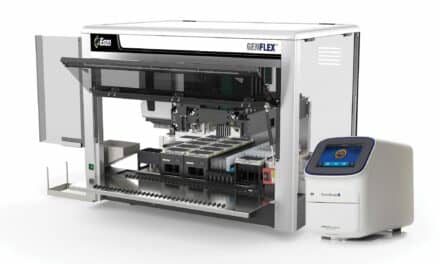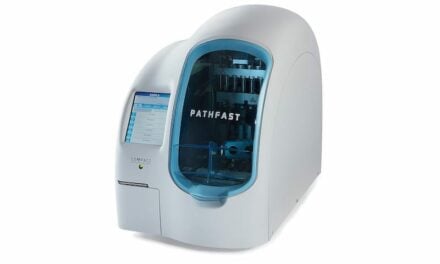CareDx, Inc., the transplant company focused on the discovery, development, and commercialization of clinically differentiated, high-value healthcare solutions for transplant patients and caregivers—today announced that its AlloSure Lung donor-derived cell-free DNA (dd-cfDNA) molecular testing service has received Medicare coverage.
The MolDX technology assessment program has determined that AlloSure Lung will be covered under the existing Medicare Local Coverage Determination for Molecular Testing for Solid Organ Allograft Rejection for use in the surveillance setting in lung transplant patients, effective May 9, 2023.1
“CareDx was the first to receive MolDX coverage of dd-cfDNA with AlloSure for kidney and heart transplant patients, and we are now proud to be the first approved for lung transplant patients. We are 100% committed to transplant patients and today’s milestone approval represents a monumental day for lung transplant patients,” says Reg Seeto, CEO and president of CareDx. “Notably, in 2021, we were the first in the field to deliver this type of non-invasive solution to monitor rejection in lung transplantation. We did so because of the significant unmet need where it is estimated that 1 in 2 lung transplant patients are expected to have their transplant fail five years post-transplant.”
The clinical validity and utility of AlloSure Lung dd-cfDNA have been demonstrated in multiple studies.2-6 AlloSure Lung has been validated to effectively identify a composite endpoint of acute cellular rejection (ACR), antibody-mediated rejection (AMR), and infection in asymptomatic lung transplant patients during routine surveillance screening.3 The use of AlloSure Lung for surveillance has been shown to identify episodes of acute rejection and infection that may have been missed using a clinically-indicated biopsy strategy alone.3 Additionally, when using an AlloSure Lung surveillance strategy, it was estimated that there were 83% fewer invasive biopsies than would have been performed under a surveillance biopsy protocol.3 The high unmet need and clinical utility have led to the rapid adoption of AlloSure Lung, now used in over 60 percent of lung transplant centers in the U.S.7
“AlloSure Lung has made a significant difference in non-invasively monitoring rejection and infection in lung transplant patients where allograft failure is a serious concern and early interventions are paramount to improving long-term outcomes,” says Nirmal Sharma, MD, medical director of the Lung Transplantation Program at Brigham and Women’s Hospital. “By using this non-invasive test, we’ve been able to implement more timely interventions. Additionally, in high-risk patients we have successfully reduced the number of surveillance bronchoscopies/biopsies and avoided the inherent risks associated with these invasive procedures.”
AlloSure Lung’s ability to offer early warnings to physicians of possible infection or organ rejection can help to inform timely therapeutic interventions. Lung transplant patients have one of the lowest median survivals of any solid organ transplant recipient, with a five-year survival rate of approximately 53%.8 Introduced in October 2021, AlloSure Lung has already been adopted in over 60% of lung transplant centers.7
References
- AlloSure Lung is covered by Medicare under MolDX LCD L38568 and using Z-code ZB9JM.
- Trindade AJ, Chapin KC, Mullican A, et al. Assessment of dd-cfDNA Levels in Clinically Stable Lung Allograft Recipients Beyond the Initial 2 y Posttransplant. Transplant Direct. 2022 Nov 17;8(12): e1411. doi:10.1097/TXD.0000000000001411. PMID: 36406896; PMCID: PMC9671749.
- Keller M, Sun J, Mutebi C, et al. Donor-derived cell-free DNA as a composite marker of acute lung allograft dysfunction in clinical care. J Heart Lung Transplant. 2022 Apr;41(4):458-466. doi: 10.1016/j.healun.2021.12.009. Epub 2021 Dec 26. PMID: 35063338.
- Keller M, Mutebi C, Shah P, et al. Biological Variation of Donor-Derived Cell-Free DNA in Stable Lung Transplant Recipients. J Appl Lab Med. 2022 Jun 30;7(4):901-909. doi: 10.1093/jalm/jfab171. Erratum in: J Appl Lab Med. 2022 Nov 12; PMID: 35024828.
- Khush KK, De Vlaminck I, Luikart H, et al. Donor-derived, cell-free DNA levels by next-generation targeted sequencing are elevated in allograft rejection after lung transplantation. ERJ Open Res. 2021 Jan 25;7(1):00462-2020. doi: 10.1183/23120541.00462-2020. PMID: 33532456; PMCID: PMC7836440.
- Sayah D, Weigt SS, Ramsey A, et al. Plasma Donor-derived Cell-free DNA Levels Are Increased During Acute Cellular Rejection After Lung Transplant: Pilot Data. Transplant Direct. 2020 Sep 24;6(10): e608. doi: 10.1097/TXD.0000000000001063. PMID: 33062841; PMCID: PMC7515612.
- CareDx data on file.
- Estimates based on OPTN (Organ Procurement and Transplantation Network). Graft survival rates for transplants performed. Accessed online at https://optn.transplant.hrsa.gov/data/view-data-reports/national-data/





